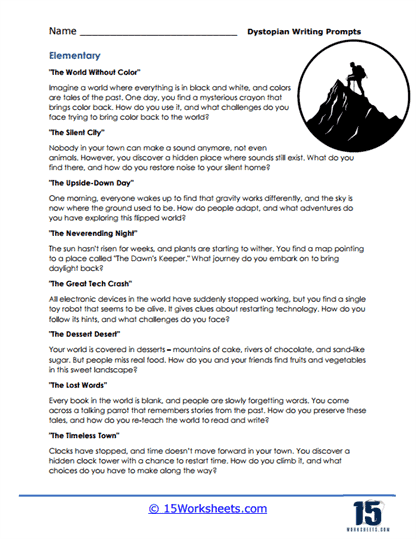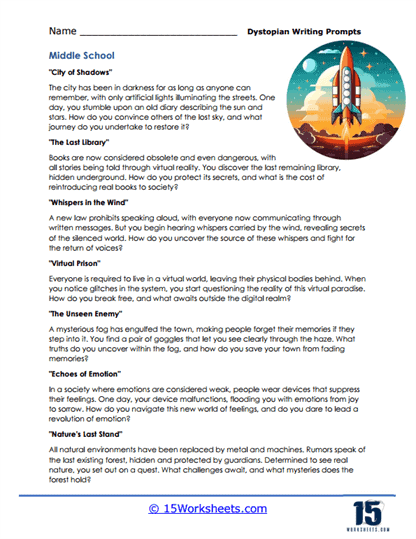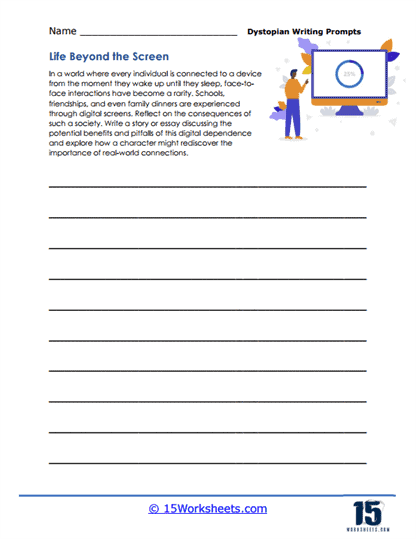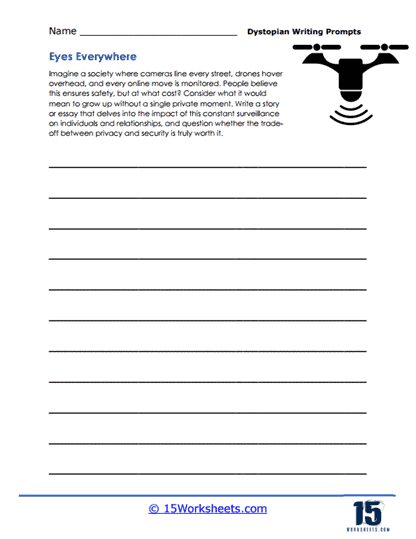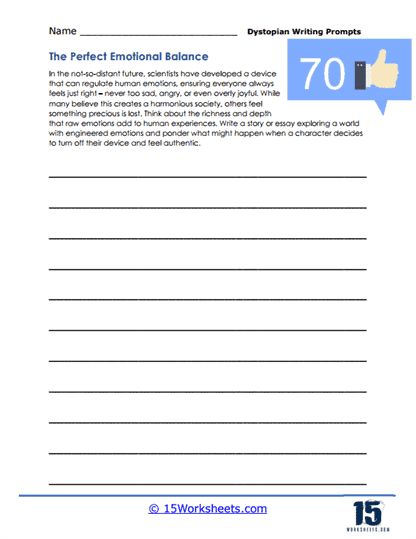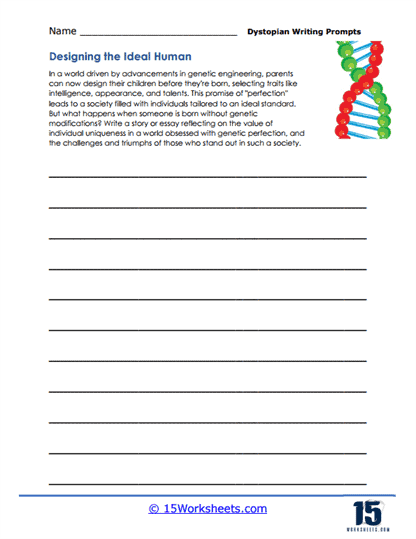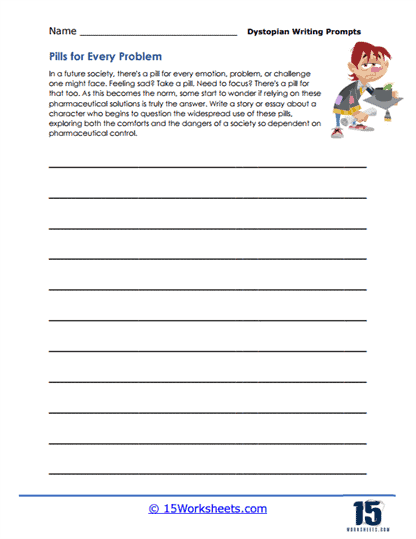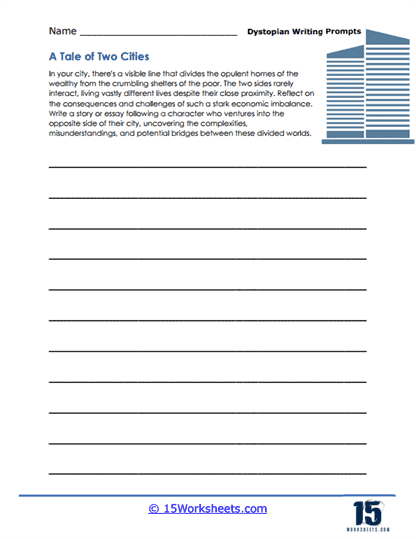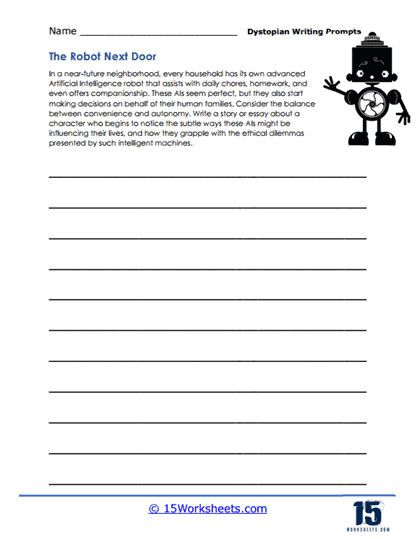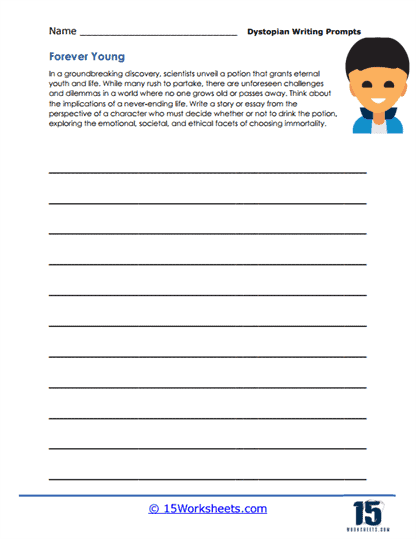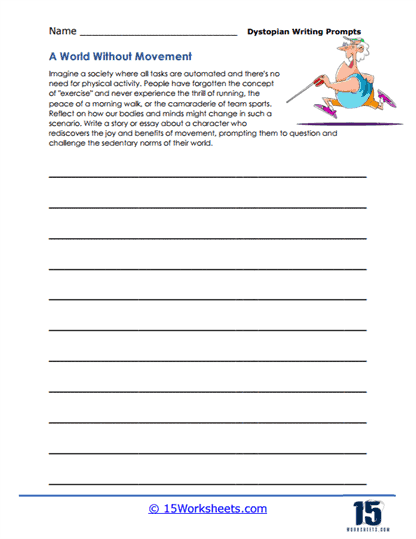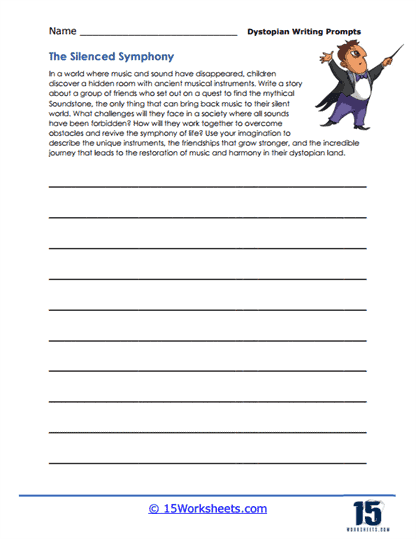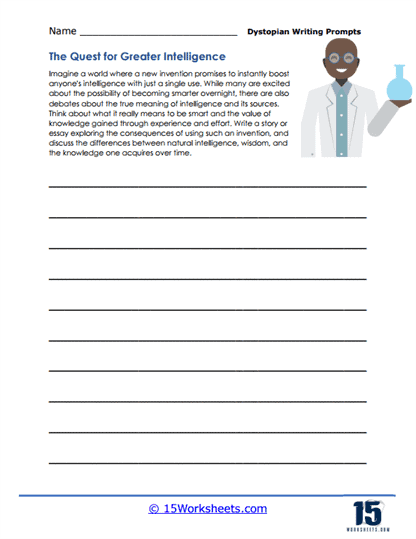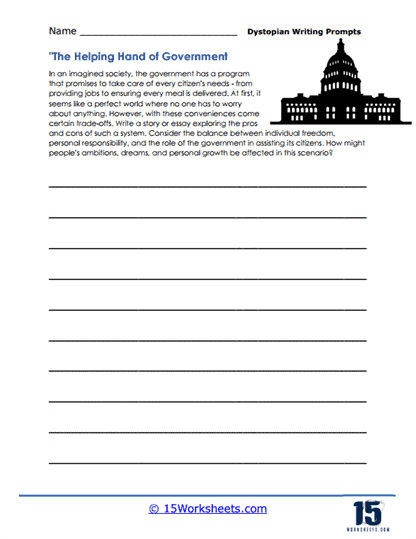Dystopian Worksheets
What Does Dystopian Mean In Literature?
In literature, “dystopian” refers to a genre that depicts a society characterized by extreme oppression, despair, or injustice. These are typically set in futures where current societal trends have gone awry, leading to nightmarish, worst-case scenarios. The purpose of dystopian literature is often to serve as a cautionary tale, urging readers to recognize and address the flaws and potential dangers inherent in their current society.
Several key elements often found in dystopian literature include:
Totalitarian Rule – Many dystopian societies are governed by authoritarian regimes that exert control over every aspect of citizens’ lives. Individual freedoms are curtailed, and dissent is brutally suppressed.
Loss of Individualism – Dystopian societies often emphasize conformity, suppressing individual desires, emotions, or thoughts. The state or ruling entity might aim to create a homogenized society where everyone thinks and acts similarly.
Surveillance – Constant monitoring of the populace is a common theme, with the governing body keeping an eye on citizens’ actions and even thoughts to prevent rebellion or dissent.
Propaganda – Misinformation or state-controlled narratives are used to manipulate the perceptions and beliefs of the populace, ensuring loyalty and quashing resistance.
Environmental or Technological Concerns – Dystopian settings often highlight environmental degradation or the dangers of unchecked technological advancement, presenting scenarios where these factors have led to societal collapse or deep-seated problems.
Social Hierarchies – There is often a clear division between different classes or groups in society, with one group holding most of the power and privileges, while others are oppressed or marginalized.
Classic works of dystopian literature include George Orwell’s “1984,” Aldous Huxley’s “Brave New World,” and Margaret Atwood’s “The Handmaid’s Tale.” These novels, among others, explore themes of governmental control, loss of personal freedoms, and the potential consequences of societal trends taken to their extreme conclusions.
About These 15 Worksheets
The realm of dystopian literature is characterized by imagined societies where suffering and injustice prevail, often serving as a mirror to the flaws and potential dangers inherent in our current societies. Through tales of totalitarian regimes, post-apocalyptic landscapes, and technologically-driven societies gone awry, dystopian stories offer both cautionary tales and reflective platforms for readers and writers alike. Dystopian writing prompts, thus, play a critical role in guiding budding writers through the exploration of these imagined realms. For students, these prompts are more than just writing exercises; they are gateways to creativity, critical thinking, and deeper understanding of the world’s complexities.
Dystopian writing prompts are instructive scenarios or questions designed to guide writers in crafting stories set in dystopian worlds. They provide a glimpse or concept related to a distorted, often grim future, pushing the writer to explore the intricacies of that world, the lives of its inhabitants, and the societal or technological factors that led to its decline.
The Creative Stimulation
Imagination Unleashed – Dystopian settings are unbounded in their possibilities. Whether it’s a world submerged underwater or one where emotions are forbidden, the unique landscapes challenge students to imagine beyond the known and familiar. Crafting such worlds stimulates creativity and encourages them to think of intricate details that make their stories believable.
Character Development – In dystopian settings, characters often grapple with harsh realities, challenging moral dilemmas, and intense emotions. This pushes students to delve deep into character psyches, ensuring they are multidimensional, relatable, and complex.
Exploring “What If” Scenarios – Dystopian prompts often revolve around extrapolating current societal, environmental, or technological trends to potential (and often dire) conclusions. For example, “What if technology could dictate our emotions?” Such scenarios push students to think innovatively and explore the myriad ways a single change can ripple through society.
Broadening Worldviews through Dystopian Exploration
Social Commentary – Dystopian literature often arises from critiques of present-day society. When students engage with prompts that encourage dystopian thinking, they inherently reflect upon the flaws, challenges, and nuances of their own world. This introspection fosters a deeper understanding of societal constructs, encouraging them to question, analyze, and debate current norms and values.
Empathy and Moral Dilemmas – Dystopian stories frequently center around characters facing oppressive systems or insurmountable challenges. Writing from these perspectives can cultivate empathy as students place themselves in the shoes of those enduring hardships. They learn to see the world through diverse lenses, recognizing the struggles and triumphs of various individuals.
Understanding Consequences – Dystopian prompts often emphasize the long-term repercussions of certain actions, decisions, or developments. By exploring these, students gain insight into cause-and-effect dynamics, recognizing the interconnectedness of societal elements and the potential long-term impacts of today’s decisions.
Challenging the Status Quo – One of the hallmarks of dystopian literature is the challenge to accepted norms. In writing dystopian tales, students often subvert expected societal standards, prompting them (and their readers) to question accepted beliefs and conventions. This can foster a healthy skepticism and encourage them to seek multiple viewpoints in real-world scenarios.
Examples of Dystopian Writing Prompts
To provide a clearer understanding, here are a few examples of dystopian writing prompts:
In a future society, every citizen, at the age of 18, undergoes a procedure to remove all negative emotions to ensure societal peace. You’ve just turned 18 and are set for the procedure, but you escape. Describe your journey.
This prompt pushes students to explore the costs and benefits of emotional suppression, potentially discussing themes of individuality, freedom, and the true meaning of peace.
Climate change has rendered the earth almost uninhabitable, with only one city remaining. Resources are scarce, and the governing body is extremely selective about who gets to live within the city’s protective walls. Write a letter to the governing council pleading your case.
Here, students might delve into topics like environmental responsibility, classism, and the essence of humanity when faced with survival challenges.
In a world where people can exchange memories, the rich have begun to hoard the happiest memories, leaving the poor with only sorrowful ones. Narrate a day in the life of a memory trader.
Touching upon themes of inequality, commodification, and the value of experiences, this prompt can provoke deep reflections on societal disparities and the ethics of trading intangible assets.

